I thought about calling this one A Young Person’s Guide to Echo Guitar but that would only end up attracting people expecting a tutorial of some kind. It’s not really a guide either, more an overview of a musical idiom whose predominant feature is guitar played through analogue or digital echo machines, often without additional instrumentation. I have a predilection for this kind of thing, something I was thinking about recently when listening to Michael Brook’s Cobalt Blue album.
A Watkins Copicat as seen (and used) in Berberian Sound Studio.
This is also another example of technology inspiring the development of new forms of music. Echoed guitar dates back to the early days of rock’n’roll but it was the advent of echo machines like the Watkins Copicat that made it possible for guitarists to produce rich clusters of sound without any other instrumentation. The Copicat was portable and could be activated with a foot pedal, making it perfect for guitar players. These machines aren’t always credited in album notes but I’d guess that one or two of the earlier recordings on this list have been made using Copicats. (John Martyn, however, preferred an Echoplex.) As for the more recent examples, one reason to write this piece is to fish for suggestions of things I may have missed. I’m sure I put a Bandcamp discovery in one of the weekend lists that involved quantities of echo guitar but I’m going to have to trawl back through old posts to find it.
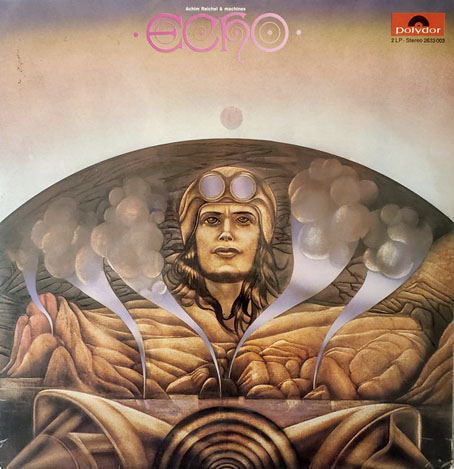
Echo (1972) by Achim Reichel and Machines
Achim Reichel is an odd character in German music. In the 1960s he was a singer and guitarist in a popular Beatles-like band, The Rattles, followed by a stint with a short-lived psychedelic outfit, Wonderland; by the 1980s he was a very successful German pop artist. For a few years in the 1970s, however, he recorded a handful of albums which in later years he seems to have found embarrassing despite their being regarded now as highlights of the so-called Krautrock era. Echo is the most adventurous of these, a double album which used to be a frustrating item, being praised by those who heard it while also being very difficult to find. The two discs contain four suites that fill each side, the first one opening with long stretches of echo-guitar which soon establish the mood of the album with their unpredictable evolution. Echo as a whole is a succession of unexpected swerves and musical detours, taking in orchestral arrangements, field recordings, snatches of song, heavy rock, and (regrettably) a long stretch of glossolalic jabbering that tests the listener’s patience. I forgive the latter when the rest of the album is so good. The guitar sound that Reichel developed here became a recurrent feature of his music for the next two years, especially in live performances.
Reichel’s popularity has overshadowed his earlier recordings to an extent that Echo wasn’t given an official reissue until 2017 when he relented to persistent requests and put together a 10-disc CD set, The Art Of German Psychedelic 1970–74. This is too much Reichel for the casual listener but if you can bear his occasional lurches into Steppenwolf-style psych-rock there’s a great deal of excellent music in the collection. Among the exclusive offerings is a superb live performance of kosmische improvisation from 1973, also an entire disc of unaccompanied echo-guitar recordings.
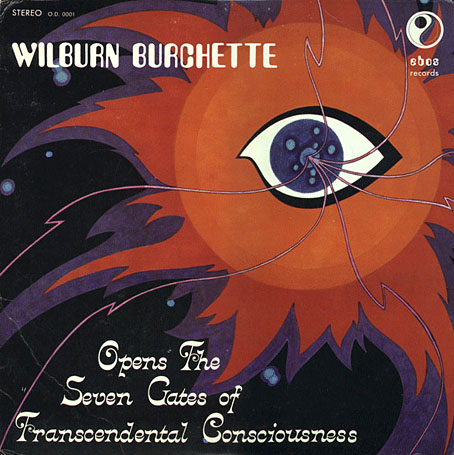
Wilburn Burchette Opens The Seven Gates Of Transcendental Consciousness (1972)
Many of Wilburn Burchette’s albums would be suitable here but I chose this one because I like the title and it has the grooviest cover. Burchette’s subtitle—“A Transcendental Ballet For The Mind Of God”—suggests something more overtly cosmic than the music itself which is less freeform than Achim Reichel. This is also the first self-released album in a list which coincidentally contains several such releases.
• Opens the Seven Gates of Transcendental Consciousness
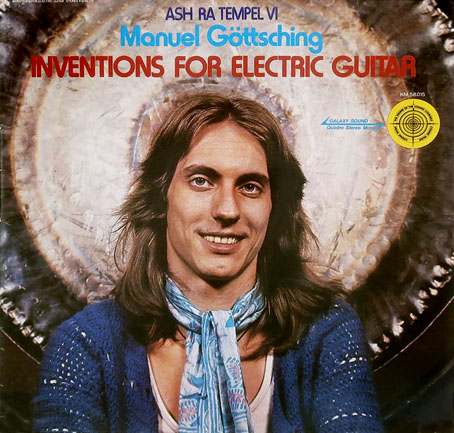
Inventions For Electric Guitar (1974) by Ash Ra Tempel/Manuel Göttsching
Cult album time. This one was labeled as the sixth release by Ash Ra Tempel but it’s really the first solo album by Manuel Göttsching, in which he used multi-track recording together with copious echo and other effects to create something that sounds more like the synthesizer music of 1974 than anything made with guitars. The cover art fixes the album in a specific time but the music itself is timeless. In 2010 he performed the album in its entirety at a Japanese music festival, assisted by three other guitarists: Steve Hillage, Elliott Sharp and Zhang Shouwang. If there’s a complete video of this concert I’ve yet to see it but there is this extract showing the musicians playing Pluralis.
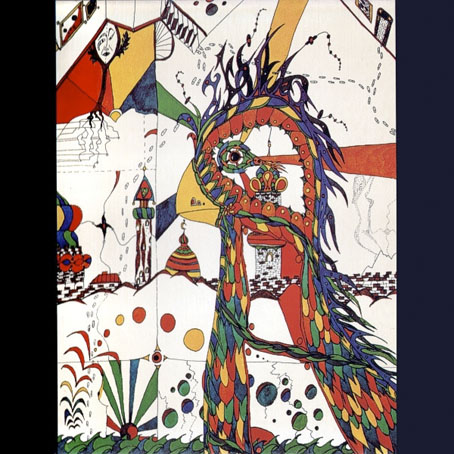
Samtvogel (1974) by Gunter Schickert
The second self-released album on the list, and Gunter Schickert’s musical debut. I’m not keen on Schickert’s songs but the second side of Samtvogel (Velvet Bird) is filled by 21 minutes of echo-guitar.
• Wald

Live At Leeds (1975) by John Martyn
The third self-released album is on the list for the 18-minute version of Outside In, originally a shorter piece on Martyn’s Inside Out album which he often played live in much longer versions. I don’t know when Martyn started playing his guitar through an Echoplex but his technique was well-established by 1973, which puts him in the vanguard of the form. He’s also unusual in favouring an acoustic guitar with a pickup connected to his effects units. I was first made aware of this in 1981 via an astonishing performance of Outside In on the BBC’s A Little Night Music. Until then I’d not heard much of his music at all, and always assumed he was a rather typical folk/blues artist, not someone who did things like this. A few weeks ago I was very pleased to find a compilation of Martyn’s early BBC appearances which includes the 1981 Outside In performance. And if you zip to the beginning of the video you can also see him playing Skip James’ I’d Rather Be The Devil in his own echo-inflected manner.
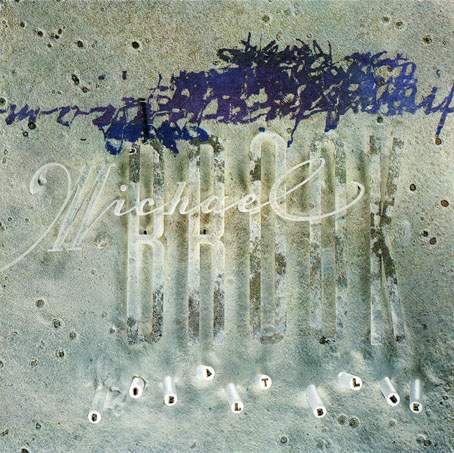
Cobalt Blue/Live At The Aquarium (1992) by Michael Brook
Michael Brook makes the list with two separate albums, Live At The Aquarium being a performance of Cobalt Blue which was given a limited release shortly after the studio album. (Both albums were later reissued as a double-disc set.) Brook is often credited with playing “Infinite Guitar” but this is a form of endless sustain, not an echo effect.
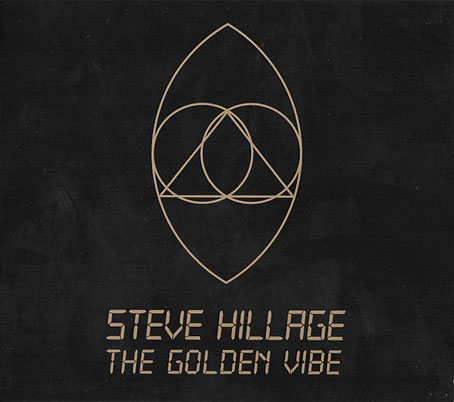
The Golden Vibe (2019) by Steve Hillage
Released in 2019 but actually recorded in 1973, this isn’t really an album as such, more a collection of sketches for future compositions. Hillage recorded the music while still in Gong but the pieces all look forward to the solo albums he was recording a few years later, with early try-outs for The Dervish Riff, Leylines To Glassdom and The Golden Vibe.
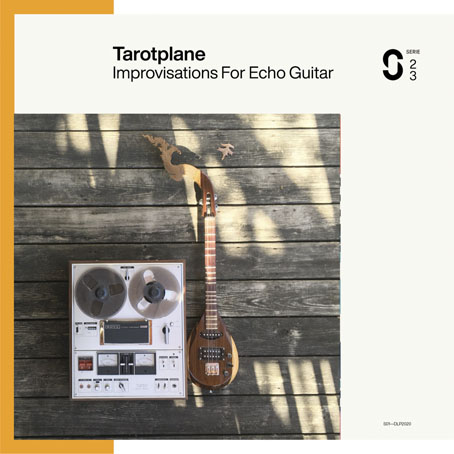
Improvisations For Echo Guitar (2023) by Tarotplane
The most recent example to date…or is it? I’m sure there’s more to be found at Bandcamp, for example, but the search options there need serious improvement.
• Improvisations For Echo Guitar
Previously on { feuilleton }
• Fender guitar catalogue, 1976
• Manuel Göttsching, 1952–2022


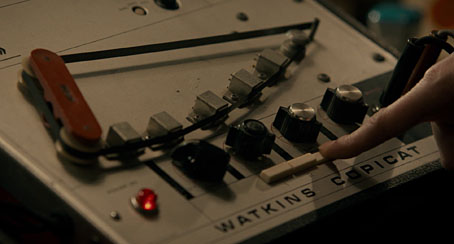
May I also suggest Dean Carter, whose “Psychomuzak” is a late-80s UK tape underground version of Gunter Schickert. Later made a couple of CDs on Delirium using the Psychomuzak moniker too. Hear here: https://www.youtube.com/watch?v=kvRpoh9Mkek
Talking of GS, I think “Puls”, the opener on Uberfallig, is his best echo guitar workout: https://www.youtube.com/watch?v=RfUDBxwVwSg
— M
Thanks, Marc, Dean Carter is someone I’ve definitely missed.
As for Herr Schickert, I’ve still not heard much so he also requires further investigation.
Great concept / post
Does the long intro to “I’m In Love With A German Film Star” by The Passions count?
https://youtu.be/iLn_oMd1DQU?si=hmmbOgm3moMGNj7N
Seems like a mix of sustain, reverb and delay / echo
Particularly pronounced in the intro but similar combinations of all three run through the whole song
Feel like they are bits of playing by The Edge that would count maybe
“A Day Without Me” for instance, off the first album Boy – after-image effect on the opening guitar riff
https://youtu.be/3U9gnjWQcJI?si=UwlkkfisOusF3dMv
Almost makes me wonder if he had heard the Manuel Gottsching album.
Did Vini Reilly not use an echo-plex at certain points? I can’t think of a specific track.
Hi Simon, thanks for commenting. I couldn’t remember what the Passions song sounded like although I must have heard it enough at the time. I’ve had in mind more solo productions than ensemble ones; John Martyn contradicts this but he also used to play many of his songs unaccompanied on stage. I suppose if you’re looking at bands from the 80s you’d have to include the Cocteau Twins for a start. (More reverb than echo but this is mutable territory.) The Moon And The Melodies especially.
The Edge maybe if he was detached from his band. I was always attracted by his guitar playing but repelled by the bellowing of Mr Bono Vox. Favourite U2 bits have been when the Vox is mixed down or excised altogether. I still think the François Kevorkian dub of Wire is better than the album version: https://www.youtube.com/watch?v=26mNLsj2YwQ
There’s some great echo-inflected Edge on Hold On To Your Dreams, an Arthur Russell cover from the one-off Snake Charmer EP by Jah Wobble and friends: https://www.youtube.com/watch?v=XmpFRV0uxs8 Kevorkian produced that one as well. A shame they couldn’t have done more together.
As for Vini Reilly, I’ve never got to grips with his extensive discography. I know the first Durutti album very well but the rest remains unexplored. A bit embarrassing really since he is (or was) a local musician, seen him walking around here on a couple of occasions.
You should definitely check out Mark McGuire:
https://markmcguire.bandcamp.com/album/a-pocket-full-of-rain
He’s the former guitarist for the Midwest Drone/Noise band Emeralds (also highly recommended) and his entire discography is based around layered solo echo guitar.
Does Frippertronics qualify?
From Wikipedia – “Frippertronics is an analogue delay system consisting of two side-by-side reel-to-reel tape recorders. The machines are configured so that the tape travels from the supply reel of the first machine to the take-up reel of the second, allowing sound recorded by the first machine to be played back on the second machine. The audio of the second machine is then routed back to the first, causing the delayed signal to repeat, while new audio is mixed in with it.”
BKenned: Thanks, I think I heard some Emeralds back when David Keenan was trying to make Hypnagogic Pop a new thing (I was sceptical) but didn’t hear anything that stuck. Easier to find their music today, however.
Andrew: Tape-delay systems are technically tape echoes, albeit very slow ones, but Fripp’s use of the delay system is a different approach to what I’ve been looking at here which is guitars interacting with self-contained echo machines. I’m very familiar with Frippertronics, I’ve got the Exposures box which contains most of what he was doing in the early 1980s:
https://www.johncoulthart.com/feuilleton/2022/05/26/exposures-exposed/
I saw John Martyn open for YES sometime in the mid-70s. I remember the odd image of a solo acoustic performer surrounded by an otherworldly Roger Dean stage landscape.
Speaking of which Steve Howe did some interesting things using the Echoplex during the early 70s but of course in a group context.
Steve Tibbetts and Terje Rypdal, both guitarists on ECM, have used echo effects on their recordings. I notice it on the following songs, but I’m not familiar enough with their catalogues to recommend the songs that best display their use of the effect:
Steve Tibbetts – Ur
https://www.youtube.com/watch?v=6WLh7LIvFsk
Terje Rypdal – Waves
https://www.youtube.com/watch?v=U8HFl7NwzDc
Thanks, Andrew. I’m not really familiar with either of them but I think Michael Mann might appreciate this post. I was watching Heat again, and the soundtrack includes two tracks from Cobalt Blue as well as a couple of Rypdal pieces. I generally like Mann’s musical taste, I’ll have to explore further.
Great post. Thank you and the discussion.
Made a playlist of this post. https://music.163.com/playlist?id=12367075600
* Sorry for my broken English.
I think Vini used an Echoplex very early on – there are photos – but I’m pretty sure it was Martin Hannett’s acquisition of one of the very first AMS digital delays that contributed to Durutti Column’s sound on record: “Digital, it was Heaven sent”.
As you may know, some of John Martyn’s gear was auctioned off earlier this month, including ‘the’ Echoplex:
https://bid.omegaauctions.co.uk/auction/lot/lot-88—johns-equipment—the-echoplex/?lot=55736&so=0&st=&sto=0&au=172&ef=&et=&ic=False&sd=1&pp=48&pn=2&g=1
Another addition to the play list might be the early solo albums by Geoff Mann, formerly of Twelfth Night, with what Geoff called his (delayed) ‘wobbly guitar’…and not a lot like Twelfth Night.
I don’t think ‘Snake Charmer’ has ever been reissued, sadly.
ehorse: Thanks!
PaulK: I’m always surprised people didn’t do more with those early digital delays. My session-musician friend, Nik, bought one circa 1981, which made me realise how Martin Hannett was getting some of those sounds. Also Jon Hassell who uses it on Dream Theory In Malaya. Hassell used it rather like a sampler which I think more people would have done if actual samplers hadn’t started to proliferate soon after.
The Snake Charmer “mini-LP” was neglected for years by Island, same with some of the other records in that series. Wobble’s disc did get a release on CD in 2018 but it seems to be scarce again judging by the prices people are asking today:
https://www.discogs.com/release/12730378-Jah-WobbleEdge-Holger-Czukay-Snake-Charmer
I got one of the CDs and was disappointed to find that a couple of tracks have been taken from vinyl. Same thing happened with the reissue of the Rain Parade release in the same series, all of which suggests that Island lost a load of master tapes somewhere along the line.
I charge Michael Brook with aiding and abetting!
Excerpt from an online article –
During a recent interview on Booked on Rock, the author of the book “U2: Song by Song,” Aaron J. Sams, discussed this topic and how a unique guitar also helped save one tune. First up: “With or Without You.”
“At one point, they talked about walking away from that song,” Sams explained (transcribed by Ultimate Guitar). “The breakthrough came when the Edge was given a prototype Infinite Guitar [by Fender]. Gavin Friday and Bono took it away to work on it when the band was ready to abandon the song. It was Gavin that convinced Bono to take it away and work on it a little bit further, but in the meantime, Edge was noodling around with this Infinite Guitar.”
“There was only two or three of those guitars created. A Canadian [Michael Brook] came up with that invention. And somewhere along the way, Bono brought back what he had been working on, Edge brought back what he had been working on, and they smushed it all together and out came ‘With or Without You,’ which I don’t think you could go anywhere as in 1987 and not hear that song on the radio.”
Source: https://www.ultimate-guitar.com/news/general_music_news/this_u2_classic_almost_got_scrapped_but_edges_guitar_parts_saved_it_author_reveals.html
Thanks, I didn’t know about that connection but it makes sense when Brook started out working as an engineer with Daniel Lanois.